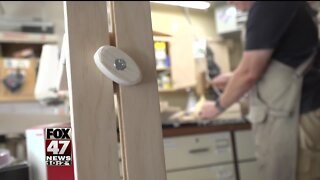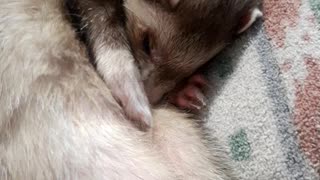White Ferret Struggles To Get Stolen Biscuit Through Air Vent
The ferret in this video probably doesn’t care about the etymology of words, but we do and we’re going to share what we learned with you. For those of us who love Great British Bake Off, which airs on PBS or Netflix if you have it, we know there is a surprising amount of difference between what the English call certain baked goods and what Americans call baked goods. The biggest, and most confusing, difference centers around the word biscuit. In the English commonwealth nations and most of Canada, a biscuit refers to small backed products that are hard and savory or sweet. For an American these baked goods are more commonly referred to as cookies or crackers.
The broad definition of biscuit in England is, we think, easier to parse with the more specific definitions in American English. American biscuits, as we know, are baked goods with a brown flaky shell and a soft interior. Since we are an English-speaking nation, why did we diverge when it comes to the word biscuit? It turns out that the divergence may have come from non-English speaking immigrants and colonists.
The Dutch in the 1700s adopted the word koekje “little cake” which referred to cakes that rise during baking. The Latin derived bescuit or bisquite referred to goods that had no raising agent, ala gingerbread. Non-English immigrants had trouble with “same but different” meaning of biscuit and started using cookie and cracker to make differentiations. The American biscuit is a distinct style of baking that appeared just before the Civil War. They were started to create cheap additions to meals that didn’t require expensive yeast. It was prized over bread at the time because it was harder than bread and held its shape better especially in any meal that involved gravy.
-
 2:04
2:04
KSHB
3 years agoFinancial struggles through the holidays
24 -
 0:59
0:59
GLMPZ
3 years agoDrive Through Franconia Notch - White Mountains, New Hampshire
87 -
 2:14
2:14
WMAR
3 years agoD'Allesio's Wood-Fire Pizza struggles to stay open through pandemic
7 -
 0:24
0:24
laughing_bailey
3 years ago $5.48 earnedDog Hilariously Struggles To Fit Stick Through Gate
5.79K5 -
 2:10
2:10
WSYM
3 years agoTeaching Through A Screen: Innovative Solution Helping Cope With Struggles
21 -
 1:45:01
1:45:01
2nd Amendment & Thin Blue Line TV UNCENSORED
3 years agoFULL: Epic Police Chase - STOLEN BIG RIG Through Southern California
38 -
 0:15
0:15
Buri0416_raccoon
4 years agoFat raccoon struggles to squeeze through cat tunnel opening
15.4K45 -
 3:06
3:06
KGTV
4 years agoHospitals helping new parents through Coronavirus struggles
5 -
 0:09
0:09
Ozzy0313
3 years ago $0.01 earnedFerret kisses
1041 -
 1:54
1:54
vernseekergreen
3 years agoFerret Cuteness
70